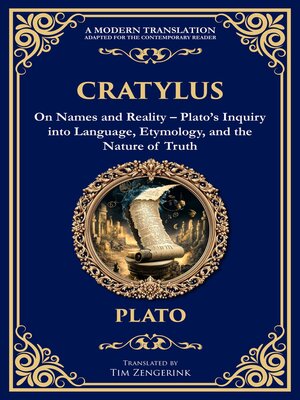Cratylus
ebook ∣ On Names and Reality: Plato's Inquiry into Language, Etymology, and the Nature of Truth · The Library of Alexandria
By Plato

Sign up to save your library
With an OverDrive account, you can save your favorite libraries for at-a-glance information about availability. Find out more about OverDrive accounts.
Find this title in Libby, the library reading app by OverDrive.



Search for a digital library with this title
Title found at these libraries:
| Library Name | Distance |
|---|---|
| Loading... |
Cratylus is one of Plato's most thought-provoking dialogues, diving deep into the mysterious relationship between language and truth. Through a captivating exchange between Socrates and two contrasting figures-Hermogenes, who believes names are arbitrary, and Cratylus, who asserts they are naturally linked to the essence of things-Plato challenges readers to reflect on how language shapes our perception of the world.
This modern translation makes one of the earliest linguistic debates accessible, vivid, and deeply relevant. Whether you're a philosopher, linguist, or curious thinker, this dialogue sheds light on issues we still grapple with today: Do words reflect reality, or do they merely point to it?
What You'll Discover in This Modern Translation:
Join the conversation that shaped centuries of linguistic theory and philosophical thought. Cratylus is not just about words-it's about what lies behind them.







